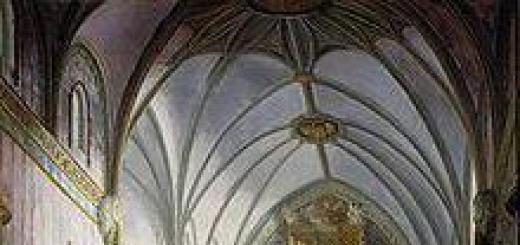This poem by Yesenin, with its stanzas, resembles a collection of ditties that are connected by a common plot, idea, and style. However, in the quatrains themselves, the logical connection is not always discernible, as in ditties.
Everyone knows the example about the elderberry and the uncle, but here: in the third stanza the first lines contain positive exclamations about sleighs (“eh!”), and in the second suddenly there is information that the hero’s father is a peasant, and he himself, logically, is a peasant’s son . The hero - the narrator represents Yesenin himself in his image. In the fourth stanza there are also two lines about how the hero doesn’t care about his poetic fame, and the last lines about how he hasn’t been in this area for a long time. This rhythm creates a feeling of courage. The hero conveys his rollicking state, saying that he abandoned everything in these cities and returned to his native village.
The poem begins relatively calmly - with a description of the “sick” area. The animated bells are crying... In this side, everything is familiar to the poet, and therefore definitely alive. In addition, he admits that the road here is “ugly,” but at the same time it is forever loved. He is ready to kiss the foot of every birch tree (personification). And in general, the poet believes that anyone who saw this sad land would be imbued with love for it. Yesenin admits that he cannot help but cry here.
In contrast to the landscape, the “youth of the villages” is shown, which seems to rush by with a hoot, playing the accordion. Even if there is a sad landscape around, people compensate for it with their positivity and Russian prowess.
And a conclusion is drawn that connects the motives of the entire poem together. So, we must remember that more than one glory was lost here, that is, people abandoned, like the hero of the poem, the empty worldliness and bustle of the city for the sake of real life in the countryside. And they did the right thing! A famous poet comes to this idea.
Analysis of the poem Small woods, steppe and distance according to plan
You might be interested
- Analysis of the poem What a cold autumn! Feta
The poem “What a Cold Autumn...” was written by Fet in 1854. It is here that the author talks about two of his favorite topics. One theme is called nature and the other theme is called love
- Analysis of the poem Tender evening. Important Twilight by Mandelstam
“It’s a gentle evening. Humid dusk…” this is how the poetic work of the famous 20th century poet Osip Mandelstam begins, written in 1910, when the author was studying at the Sorbonne.
- Analysis of Pushkin's poem Cloud 7th, 8th grade
- Analysis of Zhukovsky's ballad Svetlana 9th grade essay
The main lyrical heroine of the work, which is based on a plot borrowed from the works of European poets, is a pure and immaculate girl named Svetlana.
- Analysis of the poem If you love like me, endlessly Feta
Afanasy Fet is forced to keep the secret of his heart until his death; he constantly reproaches himself for having been forced to reject the love of a girl who could actually give him happiness and prosperity.
Lyrical work “Small Forest. Steppe and Dali,” adored by many, the representative of the new peasant poetry and lyricist S. A. Yesenin, once again shows the unusually reverent love of this real Russian poet for his Motherland. In his poetic work, it became the most beloved and popular motif. In his own, he often asked it, placing in the center the image of a wanderer who, after long wanderings and trials, returned to his native land, where, as it seemed to him, even nature trembled and rejoiced at his appearance. The theme of the road has become traditional and very common for many Russian classics, such as A. Blok, A. Pushkin, N. Nekrasov and others.
“Small forest. Steppe and distance" - Yesenin's verse
So, in the description of the plot of the poem, we see a very nondescript and unpretentious landscape. The soul and heart of the hero are worried, Yesenin imagines himself in him. At this moment, he is bursting with overwhelming emotions and rejoices, like those sobbing “spill bells” ringing “along an unsightly road, but beloved forever,” along which every Russian person has traveled many times.

Landscape in the work “Small Woods. The steppe and the distance" was specially animated by the author. Such terrain in the Russian central zone is common and unremarkable, but here it is depicted in harmony with the soul of an ordinary Russian peasant.
Yesenin never lost his feelings for his small homeland and connection with his roots. He himself said that his father was a peasant, and that is why he is a peasant’s son. In the verse “Small woods. Steppe and Dali” he compares nature with a native person, expresses feelings of gratitude and appreciation to him in his lines. The poet is sure that if anyone sees this region at least once, he will be glad to kiss every birch tree’s leg.

According to him, fame is nothing compared to this “sickly locality,” which evokes touching feelings of gratitude. Yesenin remembers her from early childhood, this land nourished him with its beauty and prosperity, delightful crimson sunsets and sunrises, fragrant herbs and impassable fords.
Analysis of the poem “Small Forest. Steppe and distance"
From the mere thought that his hero is returning to his homeland, the poet is overcome by a wave of sounds of accordion and the melodies of ditties. By the way, the verse was written in this rhythm. The tetrameter trochee, characteristic of folk ditties, was used.
It should be noted that Yesenin “Small Forest. The steppe and the distance” was one of the last to write. Here he to some extent revealed his dying premonition, which was almost always present in all his lyrics. In the last column, it is not in vain that the tavern revelry, the accordion are mentioned, and now the tragic death is following in the footsteps, which has become commonplace for the Russian people. “Oh, accordion, death is poison...”

Yesenin and homeland
The poet left his native village of Konstantinovka quite early, because he went to conquer the capital, not even suspecting what awaited him there, and what a strong longing for his native land would torment him all his life. Cheerful and dissolute Moscow will very quickly bore the Russian poet. He, of course, understood that it was not possible for his talent to break through in the village. But even having achieved enormous success in the poetic field, Yesenin did not get rid of his peasant roots, so he will devote almost every line of his creations to nature, which will become for him an inexhaustible source of poetic inspiration.
Yesenin “Small forests. “The steppe and the distance” was written in October 1925, it was then that the poet decided to visit his native rural outback for a short time - the village of Konstantinovka. His first impressions of this trip were unforgettably exciting. He was surprised by the changes that had taken place during his absence. Inspired at first by revolutionary ideas, he very quickly became disillusioned, and now only nature, that cozy corner of childhood, still greeted him warmly and affectionately, ready to console and calm conflicting thoughts and feelings, pacify pride and vanity. It is here that he is again that cheerful, mischievous boy, and not a foreign dandy in an English suit disappointed with life.

Inevitability
In the poem “Small Forest. The steppe and the distance”, the poet’s fatigue from the constant bustle of the world is felt. After all, Yesenin had already achieved everything he wanted, but he still did not understand why he lived and what was the meaning of his life.
With the last phrase of the poem, “more than one dashing glory has gone to waste,” he sincerely admits that he is ready to give up his achievements for the sake of his former joyful, modest and serene life, but, as a person already wise with experience, he understands that there is no way back for him no, just like his quiet, calm old age in his native land.
“Small forest. The steppe and the distance..." Sergei Yesenin
Small forest. The steppe and the distance.
Moonlight to all ends.
Suddenly they started crying again
Spill bells.Unsightly road
Yes, forever beloved,
Which I've traveled a lot
Every Russian person.Oh you sleigh! What a sleigh!
The sounds of frozen aspen trees.
My father is a peasant,
Well, I’m a peasant’s son.I don't care about fame
And the fact that I am a poet.
This stunted area
I haven't seen you for many years.Anyone who has seen at least once
This edge and this surface,
That one on almost every birch tree
Happy to kiss your foot.How can I not shed tears?
If with a wreath in cold and ringing
Will be around to have fun
The youth of Russian villages.Eh, accordion, death is poison,
Know, from that under this howl
More than one dashing glory
Disappeared through the grass.
Analysis of Yesenin’s poem “Small Forest. The steppe and the distance..."
Dreaming of becoming a poet, Sergei Yesenin left his native village of Konstantinovo very early and set off to conquer Moscow, not suspecting that he would miss his native land. Capital life with its temptations very soon bored the rising star of Russian literature, but Yesenin understood that he would never be able to become famous if he spent his entire life in the rural wilderness. Nevertheless, having achieved success in the poetic field, he remained an ordinary peasant guy and devoted the vast majority of his poems to native nature, which was an inexhaustible source of inspiration for him.
In 1925, Yesenin returned to his homeland for a short time and was unpleasantly surprised by the changes that had occurred in the measured way of rural life. However, the first impressions of the trip home turned out to be very touching and exciting. The poem “Small Woods” is dedicated to them. Steppe and Dali”, in which the author once again confesses his love for the Russian land and realizes that in comparison with this all-consuming feeling his creative successes simply fade. The “unsightly road” along which he happened to return to Konstantinovo evokes real delight in the poet, mixed with slight sadness. Yesenin realizes that he has long ceased to be part of this world, so familiar to him since childhood. However, the author is ready to sacrifice everything in order to touch the past even for a moment. Therefore, he declares “I don’t give a damn about fame and the fact that I’m a poet.” At this moment, it is much more important for him that he is returning home, where he has not been for almost 10 years. His feelings are so sincere that the poet “is happy to kiss almost every birch tree’s leg.”
The most vivid childhood memories for Yesenin are the sound of bells in a horse harness and the sounds of an accordion, which he calls “death-poison.” Such a comparison is not accidental, since it is precisely the playing of the accordion that evokes in the soul of a Russian person a whole range of the most contradictory feelings. For Yesenin, they symbolize valiant prowess and recklessness, so in his poem the author notes that under the “howl” of the accordion, “more than one dashing glory has disappeared into the grass.” With this phrase, the poet wants to emphasize that he is ready to give up everything that he has managed to achieve for the sake of his former life, filled with joy and serenity. However, Yesenin understands that there is no turning back for him, and regrets that he exchanged a measured rural life, simple and harmonious, for momentary success.
Small forest. The steppe and the distance.
Moonlight to all ends.
Suddenly they started crying again
Spill bells.
Unsightly road
Yes, forever beloved,
Which I've traveled a lot
Every Russian person.
Oh you sleigh! What a sleigh!
The sounds of frozen aspen trees.
My father is a peasant,
Well, I’m a peasant’s son.
I don't care about fame
And the fact that I am a poet.
This stunted area
I haven't seen you for many years.
Anyone who has seen at least once
This edge and this surface,
That one on almost every birch tree
Happy to kiss your foot.
How can I not shed tears?
If with a wreath in cold and ringing
Will be around to have fun
The youth of Russian villages.
Eh, accordion, death is poison,
Know, from that under this howl
More than one dashing glory
Disappeared through the grass.
Analysis of the poem “Small Forest. The steppe and the distance..." Yesenina
The last year of Yesenin’s life was oversaturated with various events. The poet had a presentiment of his death and sought to make the most of his remaining time. Terrible binges alternated with powerful surges of creative inspiration. The poet managed to get married for the third time and made an attempt to recover from alcohol addiction. He attached particular importance to his last trip to his native village, which he had not been to for about ten years. Impressed by this visit, Yesenin wrote several beautiful poems. One of them is “Small Forest. The steppe and the distance..." (October 1925).
The poet's state of mind was extremely difficult. His mood changed dramatically under the influence of the most insignificant reasons. This work It was written at a moment of spiritual enlightenment; there is no oppressive feeling of gloom and hopelessness in it. At the same time, some kind of unhealthy, desperate gaiety is noticeable, which is characteristic of a person in an extreme state of nervous excitement. One gets the impression that the poet is in an unstable state between laughter and tears. Contemporaries claim that this is exactly how Yesenin seemed to be during this period of time.
“Spilling bells” suddenly invade the serene picture of the landscape (“steppe and distance”). They traditionally symbolize fun, but in the poet’s case they cry. This sharp change in mood is characteristic of the entire work. The author's thoughts are fragmentary, they quickly change and overlap each other. From the image of an “unsightly road” the poet moves to the image of a sleigh, which in turn reminds him of his peasant origin. Yesenin seems to suddenly remember why he took this trip in the first place. After all, he had been striving to return to his native village for many years. This thought changes his mood again. The author speaks with emotion about his love for his native land, which is the true reason for his tears.
In the finale, Yesenin turns to the image of an accordion, calling it “death-poison.” The poet was very fond of this folk musical instrument and constantly invited accordionists to parties. To the sounds of an accordion, Yesenin fell into an exalted state, sang and danced. He believes that “under this howl” he is destined to die. Contemporaries claim that at the sight of Yesenin’s desperate joy, those present often could not help but cry.
Ending the poem with words about the disappearing “dashing glory”, the poet says goodbye to his native village forever. There were only two months left before his death.
Poem “Small Forest. Steppes and distances" - a touching declaration of S. Yesenin’s love for his small Motherland. They study it in 9th grade. We invite you to familiarize yourself with brief analysis“Small forest. Steppes and distances" according to plan.
Brief Analysis
History of creation- the work was written in 1925, when the poet visited his native village of Konstantinovo after a long separation.
Theme of the poem– love for the Motherland and the nature of the native land.
Composition– The poem is created in the form of a monologue-confession lyrical hero. Conventionally, it can be divided into several parts: a landscape sketch, a story of the lyrical hero about himself, a declaration of love for his father’s land. Formally, the work consists of seven quatrains.
Genre – landscape lyrics.
Poetic size– tetrameter trochee, cross rhyme ABAB.
Metaphors – “The spill bells began to sob,” “What a sleigh!” The ringing of frozen aspens”, “he is glad to kiss almost every birch tree’s leg”, “more than one dashing glory was lost in the grass.”
Epithets – “spill bells”, “an unsightly road, but a beloved one”, “a peasant’s son”, “a stunted area”.
History of creation
S. Yesenin left the threshold of his father’s house early. He quickly gained recognition in literary circles, but his poetic career could not overshadow the peasant soul of Sergei Alexandrovich. In 1925, the poet went to his native village of Konstantinovo. The first impressions of meeting his native places awakened in the poet’s soul memories of childhood and youth. They inspired Yesenin to create the poem “Small Forest. Steppes and distances." Later, the poet was disappointed by the changes he saw, but despite this, Konstantinovo remained a corner dear to his heart. This is how the village appears in the analyzed work.
Subject
In the poem, S. Yesenin reveals the traditional literary motif of love for one’s native land. It is realized in the monologue of the lyrical hero. The lyrical “I” is autobiographical. This technique allows the author to get as close to the reader as possible.
The topic is revealed in several stages. First, the poet describes open spaces dear to his heart. The lyrical hero apparently reached the village at night, as he watches the light of the moon pouring "all the way". Suddenly his attention is attracted by the ringing of bells, it seems that this sound was imprinted in the man’s memory as a child.
There is a road in the center of the night landscape. The Stranger immediately says that she is “unsightly.” Nevertheless, he loves this road very much, because “every Russian person has traveled along it.” This means that the path was trodden by the feet of his ancestors. A man’s favorite road evokes a storm of emotions in a man’s heart; they spill out with a proud phrase: “My father is a peasant, well, and I am a peasant’s son.”
The man realizes that fame is nothing compared to his love for the “scraping area.” Here he forgets that he is a poet. Next, he describes the trembling feelings that arise when he sees his native village. The touching monologue ends with an appeal to the accordion, symbolizing the soul of the Russian people.
Composition
The analyzed poem is a monologue-confession of the lyrical hero. Conventionally, it is divided into several semantic parts: a landscape sketch, the lyrical hero’s story about his origin, a declaration of love for his father’s land. Formally, the work consists of seven quatrains.
Genre
The genre of the poem is landscape lyricism. The poems are written in iambic tetrameter. The author used cross rhyme ABAB.
Means of expression
To reveal the theme, reproduce the emotions of the lyrical hero, his memories, language means. The author has woven into the lines metaphors- “the spill bells began to cry”, “What a sleigh! The sounds of frozen aspen trees,” “he’s happy to kiss almost every birch tree’s leg,” “more than one dashing glory has been lost in the grass,” and epithets- “spill bells”, “an unsightly road, but a beloved one”, “a peasant’s son”, “a stunted area”.










